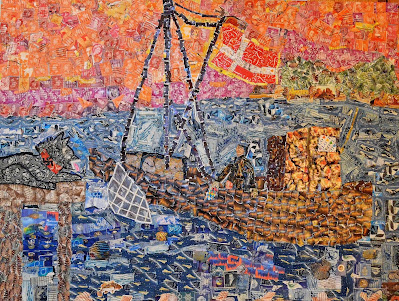Holocaust Stamps Project show the benefits of Holocaust education
Related column
This column was
written for the August 2021 edition of Jewish Rhode Island of Providence:
Those who may doubt how much Holocaust awareness will be raised with the
mandating of Holocaust and genocide education in Rhode Island’s middle and
secondary schools should familiarize themselves with the Holocaust Stamps
Project.
Massachusetts had no such mandate in the 2008-09 school year when the seed was
germinated in then-fifth-grade teacher Charlotte Sheer’s class at the Foxboro
Regional Charter School to start what became the Holocaust Stamps Project, and
still lacks such a mandate. Two bills are awaiting action to move them toward a
vote in the Legislature after hearings in May.
But the absence of a law requiring Holocaust education didn’t deter Sheer’s
determination to enlighten her young students. After they read Lois Lowry’s
“Number the Stars,” an historical fiction novel set in Nazi-occupied Denmark in
1942, the students asked some probing questions surrounding the Holocaust ---
including “How could that happen?” and “How many is 6 million?” --- and an idea
soon took shape.
“I shared with these 10- and 11- year-olds that it was not only Jewish people
who were in danger. Anyone whose skin color, beliefs, or culture wasn’t part of
the Aryan way, or who had some form of disability was in danger, bringing the
total number of targeted victims closer to 11 million. In our culturally
diverse classroom, a seed of awareness was planted,” Sheer said in an interview.
“With a number so unfathomable, I challenged the class to try collecting one
postage stamp for every person who perished in the Holocaust. Why stamps?
They’re small and accessible. The intent was to use stamps as a symbol for
something of value being discarded, as millions of people’s lives were thrown
away by the Nazis. By June that year (2009), they’d struggled to amass about
25,000 stamps. The children were just
beginning to sense the enormity of the number 11,000,000.”
But that was just the start.
Sheer’s idea “developed into the Holocaust Stamps Project and became a regular
component of the school’s Community Service Learning program,” she said.
Sheer said the project set a goal of collecting 11 million stamps to represent
the 6 million Jewish victims of the Holocaust as well as the 5 million people
from 21 European countries who were slaughtered as part of the Nazis’ Final
Solution. The
11 million includes the 1.5 million children who were Holocaust victims.
The project
took off and reached heights unimagined in its early days. Sheer and her fellow
teacher at the Foxboro school, Jamie Droste, who took over the project’s
day-to-day chores after Sheer retired, were inundated with donations. Stamps
poured in from across the globe, and the goal of collecting 11 million stamps,
once considered daunting, was reached before Yom Kippur in 2017.
The project
also produced 18 collages made from the stamps, each depicting moments and
people from the Holocaust. Those, along with the stamps have since found a
permanent home at the American Philatelic Society’s center in
Bellefonte, Pa.
The project sent the message that Holocaust education can serve as a powerful
weapon against the rising tide of anti-Semitism and Holocaust-related ignorance,
which has spawned such incidents as the use of the name of the notorious Nazi
concentration camp “Auschwitz” as a term to call football plays, as the Duxbury
High School team had reportedly done for years until the story broke in the
press in March, which led to the firing of its longtime football coach.
Holocaust education won’t end all ignorance, but in raising awareness about the
Holocaust, it can help send a message that anti-Semitism and use of Nazi
symbols is unacceptable.
In addition, a strong education effort about the Holocaust can lead to people
reaching out to help in unexpected ways.
That happened to me several years ago, in 2015, when, after writing extensively
on the Holocaust Stamps Project, I got a call at The Sun Chronicle of
Attleboro, where I had worked since 1989, from a woman in Vermont. Alice Dulude
said her husband Bill, a retired Attleboro firefighter and stamp collector,
bought a huge box of stamps at a show, and they thought it'd make a good
donation for the stamps project.
Not long after her call, her son, Bill Dulude Jr., dropped off the box to me,
and I got it to Sheer, who was ecstatic that the box had more than 60,000
stamps.
That gift still resonates with me, because it shows what the power of education
can do to make people understand about the enormity of the Holocaust.
LARRY KESSLER (larrythek65@gmail.com) is a
freelance writer based in North Attleboro. He blogs at larrytheklineup.blogspot.com

Comments
Post a Comment